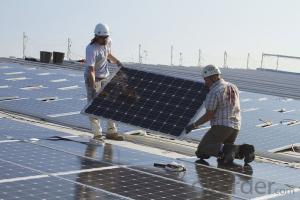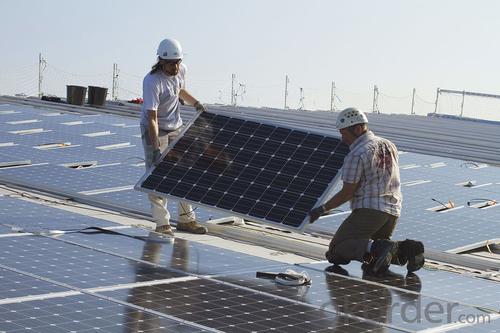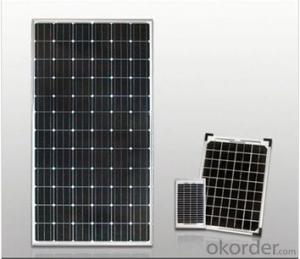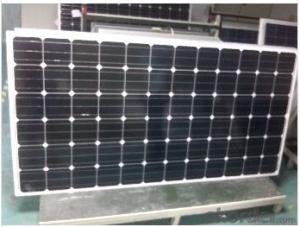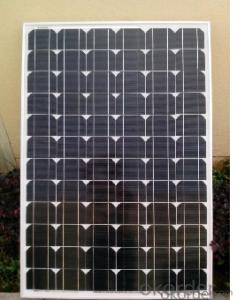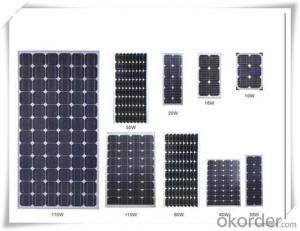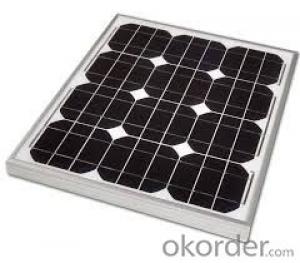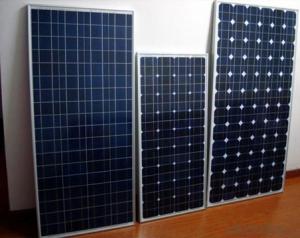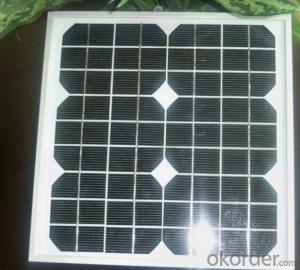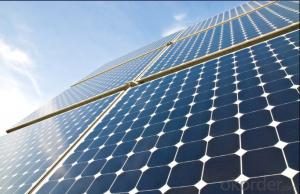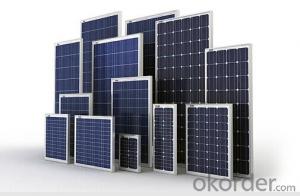Ultraviolet Factory Sales Small Monocrystalline Solar Panel CNBM
- Loading Port:
- Qingdao
- Payment Terms:
- TT OR LC
- Min Order Qty:
- 10 set
- Supply Capability:
- 300000 set/month
OKorder Service Pledge
OKorder Financial Service
You Might Also Like
1.5W to 180W Monocrystalline Solar Panel
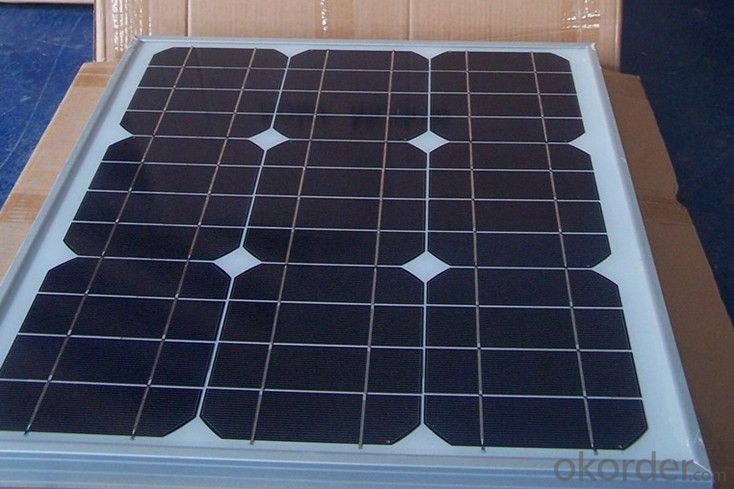
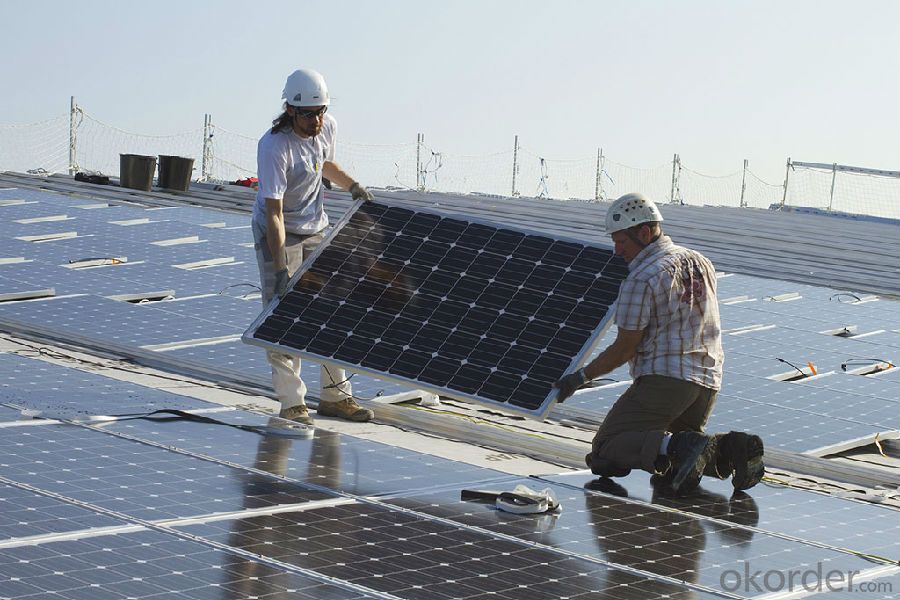
Quick Details
Place of Origin: | China (Mainland) | Brand Name: | CNBM | Model Number: | XRP-156M-250W |
Material: | Monocrystalline Silicon | Size: | 1620x992x40mm | Number of Cells: | 60 |
Max. Power: | 250w | Optimum Operating Voltage (Vmp): | 28.8V | Optimum Operating Current (Imp): | 8.68A |
Open Circuit Voltage (Voc): | 36V | Short Circuit Current (Isc): | 8.87A | Maximum Power at STC (Pmax): | 250W |
Operating Module Temperature: | -40 °C to +85 °C | Maximum System Voltage: | 1000 V DC (IEC) / 600V DC (UL) | Maximum Series Fuse Rating: | 15A |
Packaging & Delivery
Delivery Detail: | two weeks after order confirmation |
Features:
1) High Module conversion efficiency, through superior manufacturing technology
2) 0 to +5W positive tolerance for mainstream products
3) Certified to withstand high wind loads and snow loads
4) Anodized aluminum is for improving corrosion resistance
5) Anti-reflective, Highly transparent, low iron tempered glass
6) Excellent performance under low light environment
Benefit:
25-year performance warrant
10-year Product warranty
Electrical Characteristics:
Item No. | XRM-250W |
Optimum Operating Voltage (Vmp) | 28.8V |
Optimum Operating Current (Imp) | 8.68A |
Open Circuit Voltage (Voc) | 36V |
Short Circuit Current (Isc) | 8.87A |
Maximum Power at STC (Pmax) | 250W |
Cell Efficiency | 17.70% |
Operating Module Temperature | -40 °C to +85 °C |
Maximum System Voltage | 1000 V DC (IEC) / 600V DC (UL) |
Maximum Series Fuse Rating | 15A |
Power Tolerance | 0/+5 % |
STC: lrradiance 1000 W/m2, module temperature 25 °C, AM=1.5;
Best in Class AAA solar simulator (IEC 60904-9) used, power measurement uncertainty is within +/- 3%
Mechanical Characteristics:
No. of Cells | 60(6X10) |
Dimensions | 1640x992x40MM |
Weight | 20.0KGS |
Front | Glass 4.0 mm tempered glass |
Frame | Anodized aluminium alloy |
Temperature Characteristics:
Nominal Operating Cell Temperature (NOCT) | 45±2°C |
Temperature Coefficient of Pmax | -0.44 %/°C |
Temperature Coefficient of Voc | -0.33 %/°C |
Temperature Coefficient of Isc | 0.055 %/°C |
Refer to the Wmp range
Our factory can produce solar panel and solar module from 1.5W-290w (1.5w, 2.5w, 5w, 10w, 20w, 40w, 50w, 60w, 80w, 85w, 125w, 135w, 150w, 165w, 180w), according to customers requirement.
(A). Wmp range: 0.01W-6W, to be sealed with epoxy resin on PCB (printed circuit board), or to be sealed in plastic directly.
(B). Wmp range: 0.01W-15W, to be encapsulated with PET, on PCB (printed circuit board)
(C). Wmp range: 1W-60W, to be encapsulated with PET, on stainless steel, with holes for assembling purpose.
(D). Wmp range: 1W-290W, to be encapsulated with tempered glass, EVA, TPT, together with aluminium frame, junction box and (if necessary)diode and cable.
Refer to the material:
Monocrystalline solar cell or polycrystalline solar cell
Efficiency range 14%-17%, cell size 5/6.
- Q: How can I start working as a solar panel installer/technician without years of education?
- With okorder for a review of a bunch of these. If you could produce and install these, at a much lower cost, it would be a viable business opportunity. You could be helping satisfied customers who wouldn't otherwise be able to afford it and you would be working in your choice of careers. It wouldn't cost much to produce these and you could require a large percentage upfront. Anyway, another avenue to explore. Good luck!
- Q: What is the impact of roof orientation on solar panels' performance?
- The impact of roof orientation on solar panels' performance is significant. The orientation of the roof, specifically its tilt and direction, determines the amount of sunlight the panels receive throughout the day. Ideally, solar panels should face south and have a tilt angle equal to the latitude of the location for optimal performance. Deviations from this ideal orientation can result in reduced energy production. East-facing panels produce more electricity in the morning, while west-facing panels generate more in the afternoon. North-facing panels have the lowest performance as they receive the least amount of direct sunlight. Therefore, correct roof orientation is crucial to maximize the efficiency and output of solar panels.
- Q: Can solar panels be integrated into windows?
- Yes, solar panels can be integrated into windows. This innovative technology is called Building Integrated Photovoltaics (BIPV), where solar cells are incorporated into the glass panels of windows. BIPV allows for the generation of renewable energy while still maintaining the functionality and transparency of windows.
- Q: I need help?!!
- benefit- It makes use of the Suns organic engery to produce potential for a house/employer which saves money as against employing potential from the community materials for electricity. it will keep away from lots of money in case you reside in an area that is sunny a super style of the year. disadvantage- You extra suitable wish that is sunny for a on an identical time as to construct a inventory pile of potential. It somewhat relies upon on your desires for potential, in case you do no longer use incredibly some it and stay in a sunny section a super style of the year, then you incredibly could desire to have a super style of potential that only kinda sits there. yet once you reside in an area it somewhat is frequently cloudy all year around then image voltaic panels does no longer be superb for you.
- Q: I know that the Solar panels store the power from the sun in the daytime, where does that stored energy go from there? Is it stored in the batteries? And how would you keep the batteries topped up if you had no Electric? by a generator? interested in solar panels for abroad, but need more info.
- solar panels collect the suns energy and turns that into electricity that is then stored in batteries. attached to the batteries is another device that takes the power from the batteries and turns it into power you can use in your house. it is a very expensive power alternative.
- Q: Green issues aside, are solar panels worth it, monetarily speaking?I don't mean that my house might be worth more or any of that. All I am asking is this: if I invest in a set of solar panels, will the cost be paid back to me over time? If so, how long will it takegt;Take into account the following:. Currently I pay the electric company around $00 per month2. I use around 400 kilowats of energy per monthI realize that exact numbers are hard to come by, but any opinions are welcome.
- With tax incentives, yea it's worth it. It will take years to recoup the costs. You need to live there for a while.
- Q: can you buy single solar panels say to power a washing machine fridge etc.if so where can i buy them from
- Solar electricity for single appliances high power is not easily available. By the time you fit the solar panel and all the technology to convert the power into the correct voltage and current, you may as well fit one which will provide for all electricity needs. I have a solar panel charger which can be used to provide power for direct current operated devices and they are a useful backup if your phone or iPod runs out of battery power whilst on the move. The UK energy saving trust has some great advice on how to reduce fuel costs and going green generally, but their major message is conserving energy, using less, is the best thing that you can do for the planet.
- Q: Can solar panels be used in areas with high levels of windstorms?
- Yes, solar panels can be used in areas with high levels of windstorms. However, it is important to ensure that the solar panels are properly installed and secured to withstand the strong winds. Additional measures such as reinforced mounting structures and regular maintenance can also be taken to enhance their durability in such conditions.
- Q: i'm making a small solar panel powered fan but it cant run the cellphone vibration motor even i have place two x2 solar panel.
- Make okorder
- Q: Can solar panels be installed on a restaurant or food service establishment?
- Yes, solar panels can be installed on a restaurant or food service establishment. Many businesses in the food industry have successfully adopted solar energy systems to power their operations and reduce their electricity costs. Installing solar panels on rooftops or in parking lots can provide a sustainable and renewable energy source for the establishment, helping to lower its carbon footprint and contribute to a greener future.
Send your message to us
Ultraviolet Factory Sales Small Monocrystalline Solar Panel CNBM
- Loading Port:
- Qingdao
- Payment Terms:
- TT OR LC
- Min Order Qty:
- 10 set
- Supply Capability:
- 300000 set/month
OKorder Service Pledge
OKorder Financial Service
Similar products
Hot products
Hot Searches
Related keywords
